- Home
- Heather Graham
Heather Graham's Christmas Treasures Page 18
Heather Graham's Christmas Treasures Read online
Page 18
"Isabelle!" he repeated, staring into her eyes, devouring her perfect features, his callused fingers coming to rest on the gentle slope of her cheek and chin. Once more he whispered her name, and he felt the frantic pounding of her heart just before he kissed her. He touched his lips to hers, and the fire seemed to roar behind him as he delved deeply into her mouth, stroking the inner recesses with his tongue and evoking memories within them both. His lips caressed and consumed hers, and flames lapped against his chest, his thighs, his loins, until he thought he could bear no more. Her breasts thrust explicitly against his cavalry shirt as he filled himself with the sweet taste of her, a taste that would so soon be denied him.
If she had thought to fight his touch, he had quickly swept that thought from her mind. In the power of his arms she did not—could not—deny him. The kiss evoked memories. Memories of blinding, desperate passion and need, memories of tenderness, of whispers, of golden, precious moments out of time, when love had dared and defied the reality of war.
The kiss was hungry, and it was sweet, and in those stolen seconds it meant everything to him that Christmas should. It simmered with passion, yet reminded him deep inside his heart of the times when they had laughed together. Of the times when he had held her against the world. It had begun in tempest, and yet it whispered of peace and the commitment of the soul. It promised years together, evenings before an open fire with children on their laps and the sweet sounds of Christmas carols dancing in their ears. It was everything that a Christmas kiss should be.
"No!" she cried softly, breaking away from him. Her small gloved hands lay against his chest, and the tears that had glazed her eyes now dampened her cheeks. "Travis, no! I must go! Don't you understand? I have to be with my own kind for Christmas, not in the bosom of the enemy!"
"By God, Isabelle! Don't you see? You are home. This is your home—"
"Not with you in it, Travis!" she interrupted, backing away from him. "Travis, please!" The desperate sound of her tears was in her voice. "Please, let me go!"
He felt as if his body was composed of steel, taut and hard and rigid, but he forced himself to breathe, and, watching her, he slowly forced himself to bend for the paper. He handed it to her, and their fingers brushed as she reached for it.
"Don't go, Isabelle," he said simply.
"I have to!"
He shook his head. "The war is almost over—"
"I cannot be a traitor."
"Loving me would not be turning your back on your own people. The war will end. The nation must begin to heal itself, to bind up its wounds—"
"The war is not over."
"Isabelle! Lee's men are wearing rags and tatters. They're desperate for food, for boots. Don't you see? Yes, they've fought and they've died, and they've run the Union to the ground, but there are more and more of us, and we have repeating rifles when half the boys in gray are dealing with single-shot muskets! I didn't make this war, and neither did you! Isabelle—"
"Travis, don't! I don't want to hear this!"
"Stay, Isabelle."
"I can't."
"You must."
"Why?" she demanded desperately.
"Because I love you."
She froze as he spoke the simple words, her cheeks going even paler. But she shook her head in fierce denial. "We're enemies, Travis."
"We're lovers, Isabelle, and no lies, no heroics, no denials can change that!"
"You're a Yankee!" she gasped. "And no gentleman to say such things aloud!"
A pained smile touched his features. "I tried, but a gentleman could not have had you, and I had to have you. Don't leave. It's Christmas. You should be home for Christmas."
"No!" She shook her head fiercely and spun around and hurried toward the door. She went through, then slammed it in her wake.
"Isabelle!"
Travis charged after her. He heard her lean again the door, and he paused, fingers clenching and unclenching.
There was nothing left to say.
"You should be home for Christmas," he repeated softly.
He heard her sob softly, then push herself away from the door.
And then she was gone.
At length Travis wandered into the room and sat down before the fire. The flames leaped high, and he saw her face in the red-gold blaze. Come home! he thought. Come home, and be with me tonight.
He leaned back. It had been almost Christmas when they met, he thought.
From far away, he heard the piano again. The men's voices were raised in a rendition of "Silent Night." The fire continued to burn, and beyond the window the delicate flakes of snow continued to fall.
He could go after her, he thought. Maybe he should.
It had been almost Christmas, an evening like this one, when they had first met.
He closed his eyes, and he could see her again. See her as she had stood on the front steps, a woman all alone, ready to defy the entire Union Army.
Chapter 1
December, 1862
The snow had finished falling, but the house sat like an ice palace, like something out of a fairy tale. Rain had glazed over the white, newly fallen snow, and when the sun came out, the house and grounds seemed dazzling, as if they were covered with a hundred thousand diamond chips. The landscape seemed barren, a painting from a children's book. It was a place where the winter queen should live, perhaps—it certainly seemed to have no bearing on real life.
But real life was why they had come. Since the first shots had been fired at Fort Sumter, everyone had known that northern Virginia was going to be a hotbed—and that certain areas were going to have to be held by the Yanks if Washington, D.C., was to be protected.
Now, with the war raging onward, it was becoming more and more important to solidify the Union presence in Virginia. The Hinton house was just one of the places that had to be taken over. The little township was already filling with his men, and from studying his maps looking for strategic locations, Travis had known that the Hinton house would be the best place for his headquarters. His occupancy would keep the Rebs away, while he would still have easy access to the town nearby if it became necessary to pull back. In addition, he would be in a good position to join up with the main army should he be called.
The day seemed very cold and still. Travis could hear only the jangle of harness and the snorts of the horses as his small company of twenty approached the house. The breath of men mingled with the breath of the horses as they plowed through the snow, creating bursts of mist upon the air. He reined in suddenly, not knowing why, just staring at the house.
It was such an elegant structure, like a grand lady in the crystallized snow. Great Grecian columns rose high upon the broad porch, tall and imposing. The house was white, and the white, diamond-like snowflakes caught on the roof and the windows. Even the outbuildings were covered in crystal. Through one window he could see a flicker of red and gold, and he realized that a fire was burning, warm and comforting against the snow and cold.
"Captain? It's mighty cold out here," Sergeant Will Sikes reminded him.
"Yeah. Yeah, it's mighty cold," he said. He nudged Judgment, his big black thoroughbred, forward. His men, cold and quiet, survivors of Sharpsburg and more that year, followed in silence. Everyone had thought the war would be over by May. A few weeks. The Yanks had expected an easy victory, while the Rebs had thought they could beat the pants off the Yanks—which they had done upon occasion, Travis had to admit—but they hadn't counted on the tenacity of Mr. Lincoln. The President had no intention of letting the nation fall apart. He was going to fight this war no matter what. So the North had learned there was to be no easy victory, and the South had learned that the war could go on forever, and here it was, just a few days before Christmas, and they were all preparing to bed down in Virginia instead of returning home to their loved ones.
Of course, for some, Christmas was destined to be even gloomier. For some, the war had already taken its toll. Fathers, lovers, husbands and sons, many had returned
home already, returned in packages of pine, wrapped in their shrouds, and for Christmas they would lie in their familial graveyards, home for the holiday.
He was becoming morose, he reminded himself, something he couldn't allow. He was in charge of this group of twenty young men and the hundred he had left behind in the town. He had no intention of letting morale fall by the wayside, nor was he of a mind to shoot any of his men for desertion.
"Seems a fair enough place, eh?" he called out, lifting himself out of his saddle to turn and view the troops. He was met with several nods, several half smiles, and he turned once again to face the house.
That was when he saw her.
She had come out to stand on the porch. She had probably heard the jingle of the horses' trappings, and she had known that men were coming. She must have hoped it was a Confederate company, yet it seemed she had suspected Yanks, for she had come out with a shotgun, and Travis was certain it was loaded.
For the life of him, at that moment, he couldn't care.
She was clad in blue velvet, a rich, sumptuous gown with puff sleeves and a daring bodice that left her shoulders bare and gave a provocative hint of the ivory breasts that surged against the fabric. She wore no coat or cloak against the cold, but stood upon the top step of the porch, that heavy gun swept up and aimed hard at him even as a delicate tumble of sun-gold curls fell in a rich swirl against the sights. She tossed her hair back, and he knew that she was young, and though he couldn't see the color of her eyes, he knew they would be fascinating. He knew that he had never seen a more beautiful woman, more striking, more delicate and fine. For several seconds he lost sight of duty and honor, even of the fact that he was fighting a war.
"She looks like she intends to use that thing," Will muttered, casting Travis a quick glance. "What do you think, Captain?"
Travis shrugged, grinning. She couldn't be about to shoot them. One lone woman against a party of twenty men. He lifted a hand and twisted in the saddle to speak. "Hold up, men. I'll do the talking and see if we can't keep this polite."
He urged his mount forward, leaving the others by the snow-misted paddocks and gate. She aimed the shotgun straight at him, and he pulled up his horse, lifting a hand to her in a civil gesture.
"Stop right where you are, Yank!" she commanded. The voice matched the woman. It was velvet and silk. It was strong, but with shimmery undertones that made her all the more feminine.
"Miss Hinton, I'm Captain Travis Aylwin of the—"
"You're a Yank, and I want you off my property."
He dismounted and headed for the steps that led to the porch. His heavy wool cape flapped behind him, caught by the breeze. He tugged his plumed hat over his forehead in acknowledgement that he had come upon a lady, but before he could take the first step he discovered himself spinning in astonishment. She had fired the rifle and just skimmed the feather on his hat.
"Son of a bitch!" he roared.
Behind him, twenty rifles were cocked.
"Hold it! Hold it!" he shouted to his men. He jerked off his singed hat and sent it flying down on a snowdrift, then glared at this southern angel, his dark eyes flashing with fury. "What the hell is the matter with you? If you had hit me—"
"If I had intended to hit you, Captain, you'd be dead," she promised softly, solemnly. "Now, get your men and move off my property."
He threw back his cape, set a booted foot on the first step, placed his hands on his hips and clenched his teeth. There was no easy way to take over a person's property, but this was war.
"So you didn't intend to hit me, huh?" he demanded.
"Don't you believe me, Captain?" An exquisite brow rose with the inquiry.
"Oh, yes, ma'am, I believe you. If I didn't, you'd be tied up and on the backside of a horse right now."
He watched her eyes narrow and a slow crimson flush rise to her cheeks. She started to aim the rifle again, and though he wanted to believe that she wasn't stupid or vicious enough to shoot a man—even a Yank—he didn't want to take any chances. He leaped up the remaining steps, sweeping an arm around her waist to wrest the rifle from her grip. A soft gasp escaped her, but her grip was strong, and his efforts to dislodge the weapon sent them both reeling off balance. Suddenly they were tumbling down the steps and careening into a snowdrift. Travis instinctively attempted to keep his body lodged beneath hers. He didn't know why—-she wanted to shoot him. Maybe he just couldn't bear the idea of such a beautiful creature being hurt in any way.
When they landed, she was still seething and fighting. He wrenched her beneath him, securing her wrists, and spat out an oath. There was no nice way to do this, no nice way at all.
"Lady, in the name of the United States government—"
"The U.S. government be damned! This is the Confederacy! Don't threaten me with the U.S. government!"
"Lady," he said wearily, "this is war—"
"Get off my property!"
"In the name—"
"Get off me! I will not listen to a government that—"
He jerked her hands hard, dragging them high above her head, and leaned very close to her. "Don't listen to the government, then, listen to me. Listen to me because I'm twice your size, ten times your strength—and because I have twenty armed men behind me. Is that logical enough for you? Listen, now, and listen good. I'm taking this house. It's called confiscation, and it is something that happens during times of war. I'm sorry that your property happens to be so close to the border, but that's the way it is."
She blinked, and he noticed snowflakes clinging tightly to her eyelashes and dusting her cheeks. She was very white, and she was shivering beneath him. He didn't know whether it was the cold that made her shiver, or if she was trembling with rage. She moistened her lips to speak, and he found himself staring in fascination at her mouth, her pink tongue as it moved over her lips. They were wonderful lips, well defined, full, sensual, beautiful. He wanted to touch them. He wanted to feel the sizzling warmth he knew he would find within the recesses of her mouth.
He blinked, straightening against the cold of the day.
She spoke then, the breath rushing from her in a gust. "You're not going to burn the house?"
He almost smiled. She might hate having a pack of Yankees on her property, but she did want her property to survive.
He shook his head. "I'm taking the house for my headquarters. These fellows will bunk here—I have another hundred men in town. We'll do our best to compensate you for what we use."
She was still staring at him, unblinking now. Her velvet gown was wet with snow, her golden hair lying like curious rays of golden sun against it, and her gray-green eyes were startlingly bright and deep against the pallor of her cheeks. He felt her tremble again and saw that the snow was touching her bare shoulders and her breasts where they rose above her bodice. Little flakes fell deep into the shadowed valley between them. Lucky snowflakes, Travis thought, then he realized that she was freezing and silent in her misery. He thought with a sudden, unreasoning fury that she was what the South was made of, that she would suffer any agony in silence, that her pride was worth everything to her. This war would go on until eternity because of all the damn Southerners just like her. They had something that all the Yankee weaponry and numbers could not best, that sense of pride, of honor.
"Get up!" he snapped suddenly.
"I can hardly do that, sir, when you're lying on top of me!" she returned, but he had already thrust himself upward and reached down to help her. She didn't want to take his hand, but he allowed her no nonsense, taking hers. He drew her to her feet and swept his cloak from his shoulders, then threw it over hers. "I don't need Yankee warmth!" she protested.
"Whether you need it or not, you'll take it!" he growled and prodded her toward the steps. "Who else is inside?"
"General Lee and the entire army of Northern Virginia," she said sweetly.
"Sergeant! Draw a detail of five and shoot anyone inside that house who lives and breathes!"
"No!" she cr
ied out in protest. She spun around, caught within his arms, but meeting his eyes again. "I'll tell you who's inside!" she snapped. "Peter, the butler, Mary Louise, my maid, Jeanette, Etta and Johnny Hopkins, all of them house servants. In the barn you'll find Jeremiah, the blacksmith, and five others, field hands. That's it. Just the servants—"
"Just the slaves?"
She lifted her chin, smiling with such a supreme sense of superiority that he wanted to slap her. "My parents are dead; and my brothers are fighting. The servants are all free men and women, Captain. My brothers saw to that before they left for the fighting. All free so that they could leave if trouble came—and not be shot by the likes of you!"
Her blacks were far more likely to be shot by renegade Confederates, but he wasn't going to argue the point with her. He turned around, trusting her suddenly, because she had no more reason to lie. "Sergeant, bring the men in. It's getting damn cold out here. Oh, excuse me, Miss Hinton." He bowed to her then bent to pick up his hat from the snowdrift. He started up the steps, then paused, for she was staring at him with pure hatred. "Lead the way, Miss Hinton."
"Why, Captain? I'm not inviting you in."
He walked down and caught her arm, a growling sound caught in his throat. He had assumed that the Southern belle he had to wrest the house from might have the vapors, or faint at the sight of a Yankee detail. He hadn't expected her to come after him with a shotgun, nor had he expected this defiance.
"Fine. I can escort you elsewhere."
"What?" she said.
"I can see that you are sent elsewhere, if that is your wish. I can pack you south, Miss Hinton. Where would you like to go? Richmond, New Orleans, Savannah, Charleston?"
"You intend to throw me out of my own house?"
A tug-of-war was going on within her beautiful eyes. She didn't want to be near him—but neither did she want to desert her home. He smiled. "Lady, the choice is yours."
"Captain, you're not going to be here long enough to do anything to me."
"I won't be?"

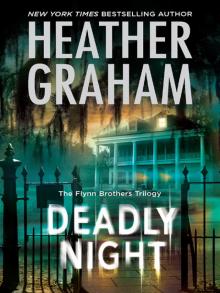 Deadly Night
Deadly Night The Uninvited
The Uninvited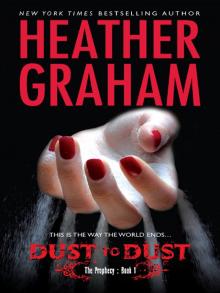 Dust to Dust
Dust to Dust Heart of Evil
Heart of Evil A Perfect Obsession
A Perfect Obsession The Keepers
The Keepers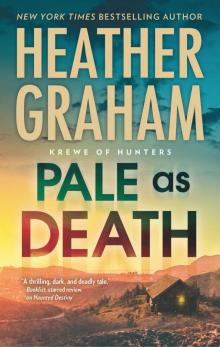 Pale as Death
Pale as Death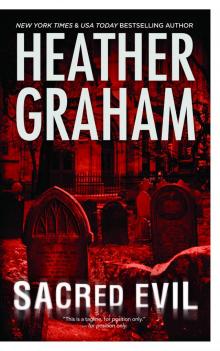 Phantom Evil
Phantom Evil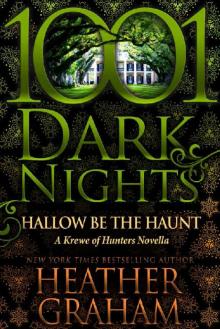 Hallow Be the Haunt
Hallow Be the Haunt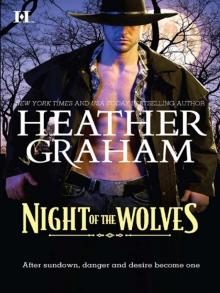 Night of the Wolves
Night of the Wolves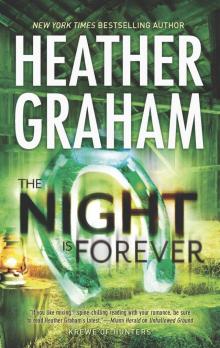 The Night Is Forever
The Night Is Forever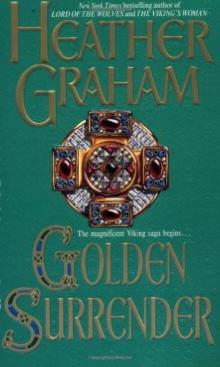 Golden Surrender
Golden Surrender Kiss of Darkness
Kiss of Darkness Beneath a Blood Red Moon
Beneath a Blood Red Moon A Dangerous Game
A Dangerous Game Ghost Shadow
Ghost Shadow Long, Lean, and Lethal
Long, Lean, and Lethal Fade to Black
Fade to Black The Rising
The Rising And One Wore Gray
And One Wore Gray Rebel
Rebel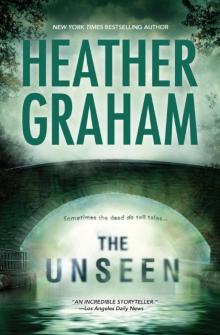 The Unseen
The Unseen The Night Is Watching
The Night Is Watching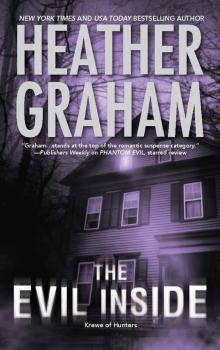 The Evil Inside
The Evil Inside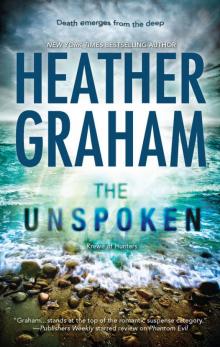 The Unspoken
The Unspoken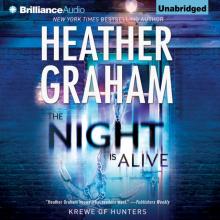 The Night Is Alive
The Night Is Alive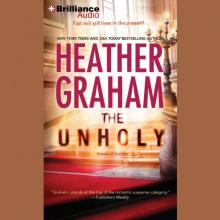 The Unholy
The Unholy Nightwalker
Nightwalker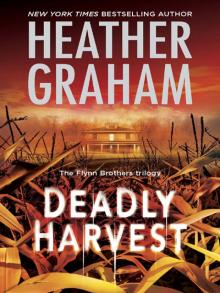 Deadly Harvest
Deadly Harvest An Angel for Christmas
An Angel for Christmas A Pirate's Pleasure
A Pirate's Pleasure American Drifter
American Drifter Realm of Shadows
Realm of Shadows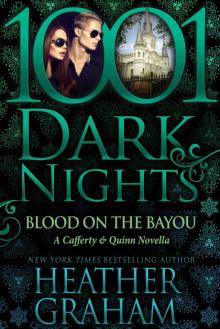 Blood on the Bayou
Blood on the Bayou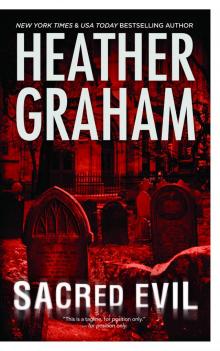 Sacred Evil
Sacred Evil Dying to Have Her
Dying to Have Her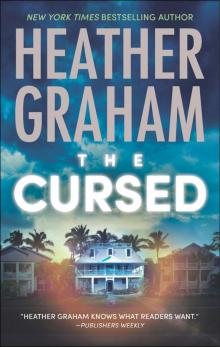 The Cursed
The Cursed Captive
Captive Hurricane Bay
Hurricane Bay Drop Dead Gorgeous
Drop Dead Gorgeous Ghost Memories
Ghost Memories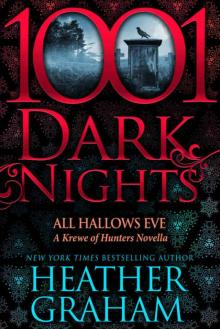 All Hallows Eve
All Hallows Eve Dying Breath
Dying Breath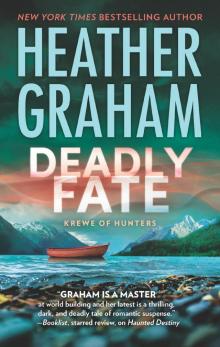 Deadly Fate
Deadly Fate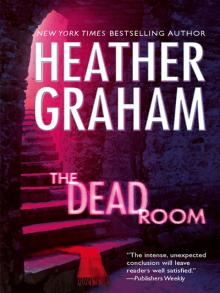 The Dead Room
The Dead Room Lord of the Wolves
Lord of the Wolves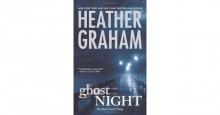 Ghost Night
Ghost Night Ghost Walk
Ghost Walk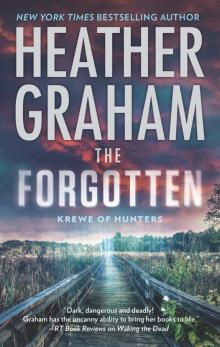 The Forgotten
The Forgotten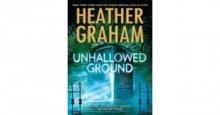 Unhallowed Ground
Unhallowed Ground One Wore Blue
One Wore Blue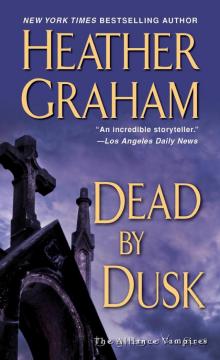 Dead By Dusk
Dead By Dusk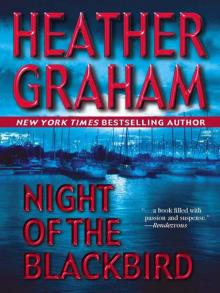 Night of the Blackbird
Night of the Blackbird The Dead Play On
The Dead Play On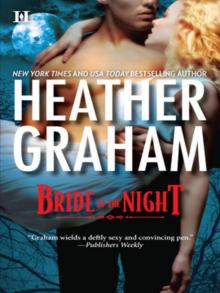 Bride of the Night
Bride of the Night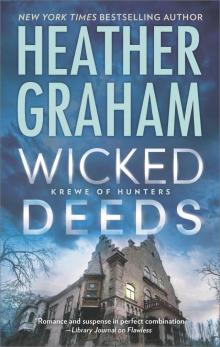 Wicked Deeds
Wicked Deeds The Forbidden
The Forbidden Triumph
Triumph Out of the Darkness
Out of the Darkness Love Not a Rebel
Love Not a Rebel The Last Noel
The Last Noel Tall, Dark, and Deadly
Tall, Dark, and Deadly The Death Dealer
The Death Dealer Dead on the Dance Floor
Dead on the Dance Floor Law and Disorder
Law and Disorder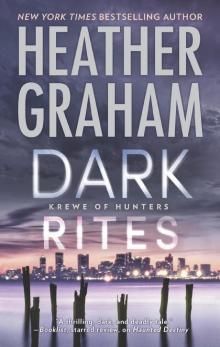 Dark Rites
Dark Rites New Year's Eve
New Year's Eve Hostage At Crystal Manor
Hostage At Crystal Manor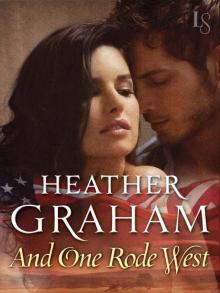 And One Rode West
And One Rode West Home in Time for Christmas
Home in Time for Christmas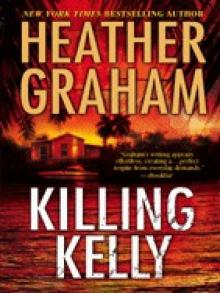 Killing Kelly
Killing Kelly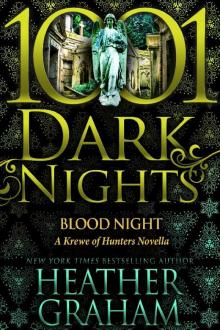 Blood Night
Blood Night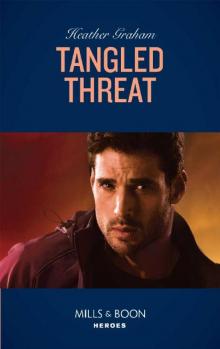 Tangled Threat (Mills & Boon Heroes)
Tangled Threat (Mills & Boon Heroes)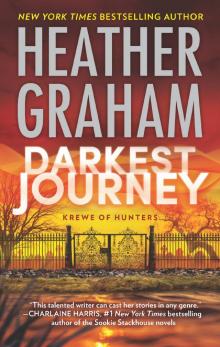 Darkest Journey
Darkest Journey Glory
Glory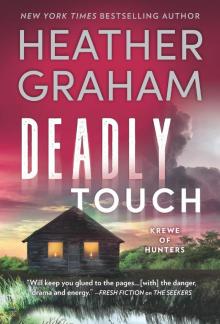 Deadly Touch
Deadly Touch An Unexpected Guest
An Unexpected Guest Night of the Vampires
Night of the Vampires Seize the Wind
Seize the Wind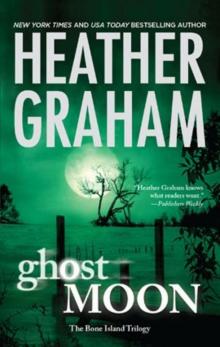 Ghost Moon
Ghost Moon The Vision
The Vision Dreaming Death
Dreaming Death Conspiracy to Murder
Conspiracy to Murder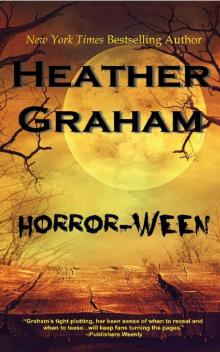 Horror-Ween (Krewe of Hunters)
Horror-Ween (Krewe of Hunters)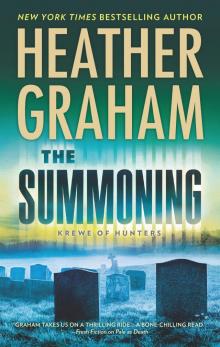 The Summoning
The Summoning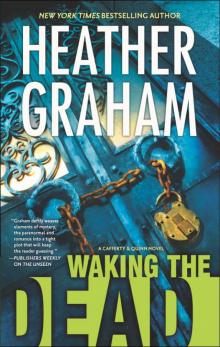 Waking the Dead
Waking the Dead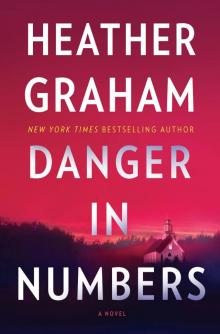 Danger in Numbers
Danger in Numbers The Hidden
The Hidden Sweet Savage Eden
Sweet Savage Eden Tangled Threat ; Suspicious
Tangled Threat ; Suspicious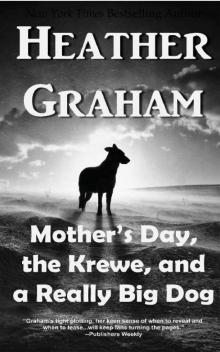 Mother's Day, the Krewe, and a Really Big Dog
Mother's Day, the Krewe, and a Really Big Dog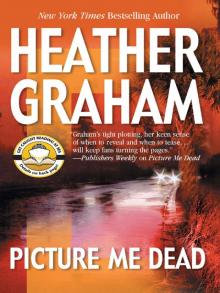 Picture Me Dead
Picture Me Dead The Killing Edge
The Killing Edge St. Patrick's Day
St. Patrick's Day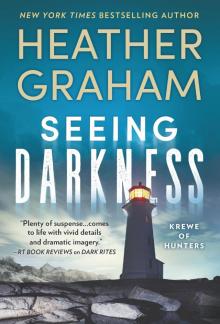 Seeing Darkness
Seeing Darkness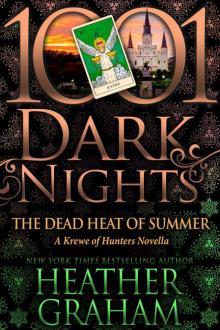 The Dead Heat of Summer: A Krewe of Hunters Novella
The Dead Heat of Summer: A Krewe of Hunters Novella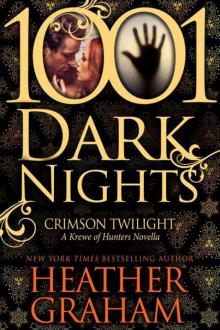 Crimson Twilight
Crimson Twilight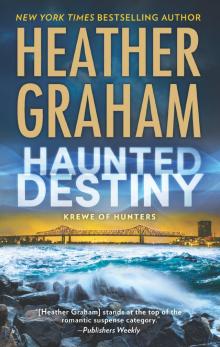 Haunted Destiny
Haunted Destiny Devil's Mistress
Devil's Mistress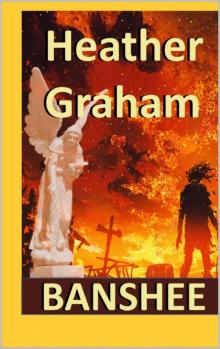 Banshee
Banshee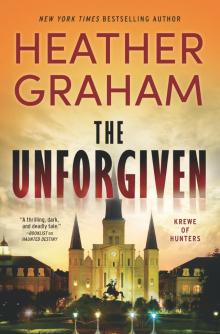 The Unforgiven
The Unforgiven The Final Deception
The Final Deception A Horribly Haunted Halloween
A Horribly Haunted Halloween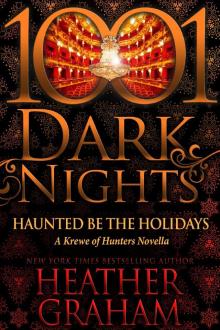 Haunted Be the Holidays
Haunted Be the Holidays Deadly Gift
Deadly Gift Easter, the Krewe and Another Large White Rabbit
Easter, the Krewe and Another Large White Rabbit Haunted
Haunted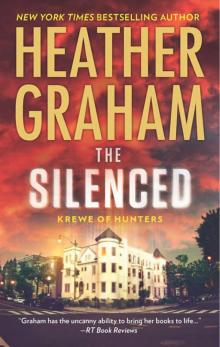 The Silenced
The Silenced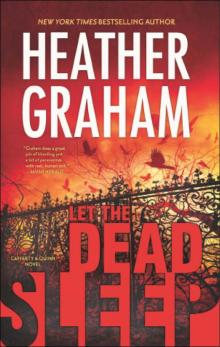 Let the Dead Sleep
Let the Dead Sleep Christmas, the Krewe, and Kenneth
Christmas, the Krewe, and Kenneth Big Easy Evil
Big Easy Evil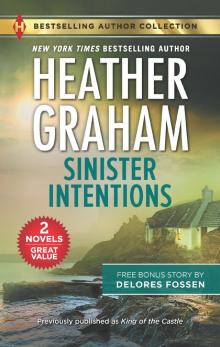 Sinister Intentions & Confiscated Conception
Sinister Intentions & Confiscated Conception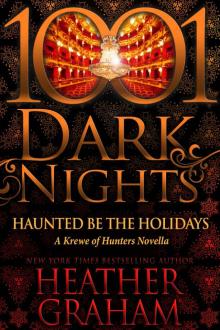 Haunted Be the Holidays: A Krewe of Hunters Novella
Haunted Be the Holidays: A Krewe of Hunters Novella Blood Red
Blood Red A Perilous Eden
A Perilous Eden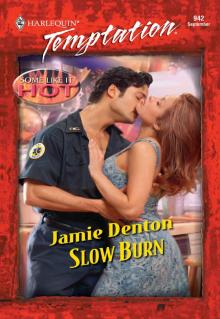 Slow Burn
Slow Burn Strangers In Paradise
Strangers In Paradise Bitter Reckoning
Bitter Reckoning Krewe of Hunters, Volume 1: Phantom Evil ; Heart of Evil ; Sacred Evil ; The Evil Inside
Krewe of Hunters, Volume 1: Phantom Evil ; Heart of Evil ; Sacred Evil ; The Evil Inside Do You Fear What I Fear?
Do You Fear What I Fear? The Face in the Window
The Face in the Window Krewe of Hunters, Volume 3: The Night Is WatchingThe Night Is AliveThe Night Is Forever
Krewe of Hunters, Volume 3: The Night Is WatchingThe Night Is AliveThe Night Is Forever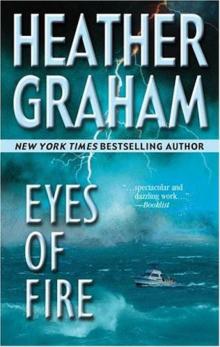 Eyes of Fire
Eyes of Fire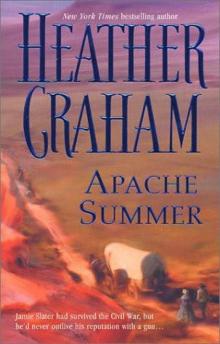 Apache Summer sb-3
Apache Summer sb-3 Sensuous Angel
Sensuous Angel In the Dark
In the Dark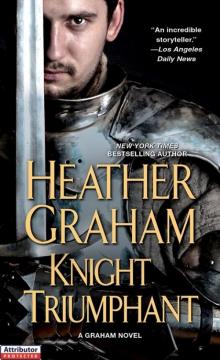 Knight Triumphant
Knight Triumphant Hours to Cherish
Hours to Cherish Tender Deception
Tender Deception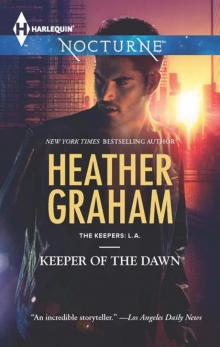 Keeper of the Dawn tkl-4
Keeper of the Dawn tkl-4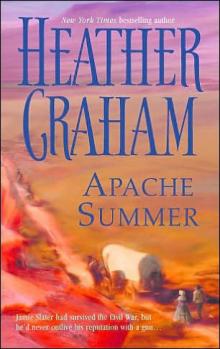 Apache Summer
Apache Summer Between Roc and a Hard Place
Between Roc and a Hard Place Echoes of Evil
Echoes of Evil The Game of Love
The Game of Love Sacred Evil (Krewe of Hunters)
Sacred Evil (Krewe of Hunters) Bougainvillea
Bougainvillea Tender Taming
Tender Taming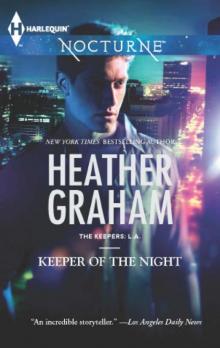 Keeper of the Night (The Keepers: L.A.)
Keeper of the Night (The Keepers: L.A.) Lonesome Rider and Wilde Imaginings
Lonesome Rider and Wilde Imaginings Lucia in Love
Lucia in Love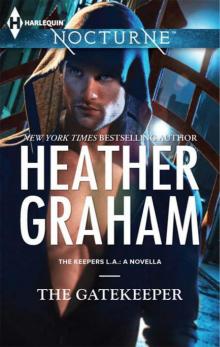 The Gatekeeper
The Gatekeeper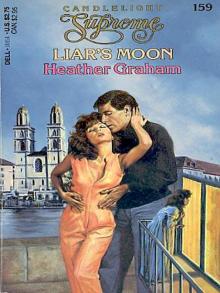 Liar's Moon
Liar's Moon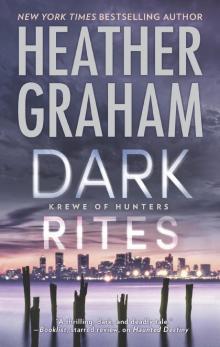 Dark Rites--A Paranormal Romance Novel
Dark Rites--A Paranormal Romance Novel A Season for Love
A Season for Love Krewe of Hunters, Volume 6: Haunted Destiny ; Deadly Fate ; Darkest Journey
Krewe of Hunters, Volume 6: Haunted Destiny ; Deadly Fate ; Darkest Journey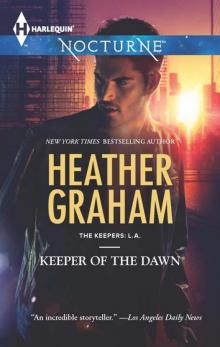 Keeper of the Dawn (The Keepers: L.A.)
Keeper of the Dawn (The Keepers: L.A.)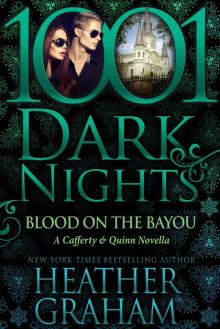 Blood on the Bayou: A Cafferty & Quinn Novella
Blood on the Bayou: A Cafferty & Quinn Novella Double Entendre
Double Entendre A Perfect Obsession--A Novel of Romantic Suspense
A Perfect Obsession--A Novel of Romantic Suspense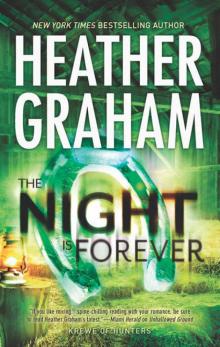 The Night Is Forever koh-11
The Night Is Forever koh-11 The Di Medici Bride
The Di Medici Bride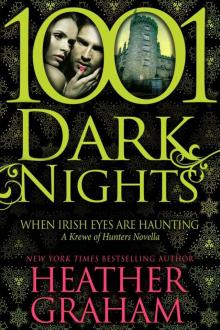 When Irish Eyes Are Haunting: A Krewe of Hunters Novella
When Irish Eyes Are Haunting: A Krewe of Hunters Novella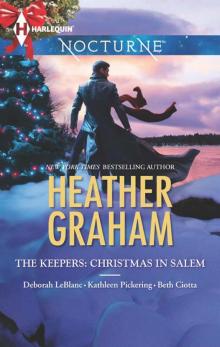 The Keepers: Christmas in Salem: Do You Fear What I Fear?The Fright Before ChristmasUnholy NightStalking in a Winter Wonderland (Harlequin Nocturne)
The Keepers: Christmas in Salem: Do You Fear What I Fear?The Fright Before ChristmasUnholy NightStalking in a Winter Wonderland (Harlequin Nocturne) Never Fear
Never Fear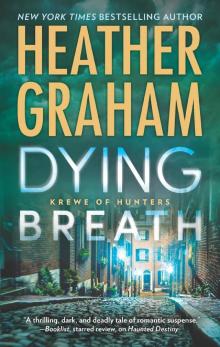 Dying Breath--A Heart-Stopping Novel of Paranormal Romantic Suspense
Dying Breath--A Heart-Stopping Novel of Paranormal Romantic Suspense If Looks Could Kill
If Looks Could Kill This Rough Magic
This Rough Magic Heather Graham's Christmas Treasures
Heather Graham's Christmas Treasures Hatfield and McCoy
Hatfield and McCoy The Trouble with Andrew
The Trouble with Andrew Never Fear - The Tarot: Do You Really Want To Know?
Never Fear - The Tarot: Do You Really Want To Know?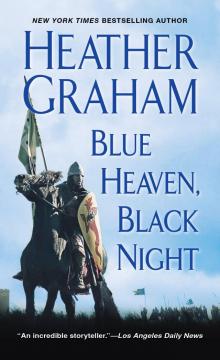 Blue Heaven, Black Night
Blue Heaven, Black Night Forbidden Fire
Forbidden Fire Come the Morning
Come the Morning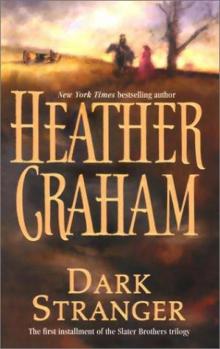 Dark Stranger sb-4
Dark Stranger sb-4 Lie Down in Roses
Lie Down in Roses Red Midnight
Red Midnight Krewe of Hunters Series, Volume 5
Krewe of Hunters Series, Volume 5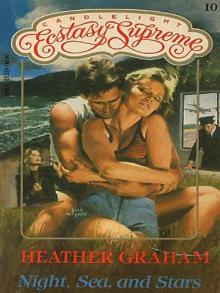 Night, Sea, And Stars
Night, Sea, And Stars Snowfire
Snowfire Quiet Walks the Tiger
Quiet Walks the Tiger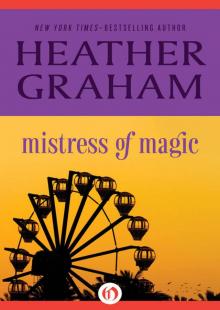 Mistress of Magic
Mistress of Magic For All of Her Life
For All of Her Life Runaway
Runaway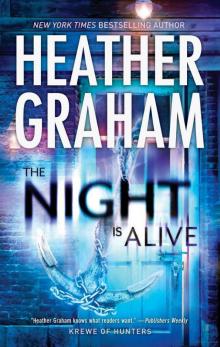 The Night Is Alive koh-10
The Night Is Alive koh-10 The Evil Inside (Krewe of Hunters)
The Evil Inside (Krewe of Hunters)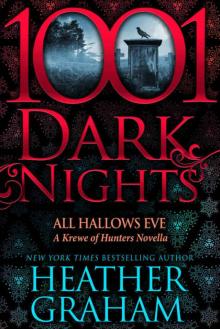 All Hallows Eve: A Krewe of Hunters Novella (1001 Dark Nights)
All Hallows Eve: A Krewe of Hunters Novella (1001 Dark Nights) Tomorrow the Glory
Tomorrow the Glory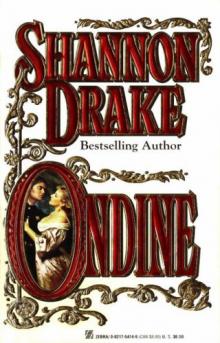 Ondine
Ondine Angel of Mercy & Standoff at Mustang Ridge
Angel of Mercy & Standoff at Mustang Ridge Bride of the Tiger
Bride of the Tiger When Next We Love
When Next We Love Heather Graham Krewe of Hunters Series, Volume 4
Heather Graham Krewe of Hunters Series, Volume 4 A Season of Miracles
A Season of Miracles Realm of Shadows (Vampire Alliance)
Realm of Shadows (Vampire Alliance) When We Touch
When We Touch Serena's Magic
Serena's Magic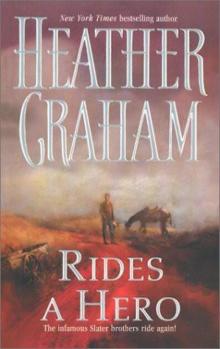 Rides a Hero sb-2
Rides a Hero sb-2 All in the Family
All in the Family Handful of Dreams
Handful of Dreams A Stranger in the Hamptons
A Stranger in the Hamptons Krewe of Hunters, Volume 2: The Unseen ; The Unholy ; The Unspoken ; The Uninvited
Krewe of Hunters, Volume 2: The Unseen ; The Unholy ; The Unspoken ; The Uninvited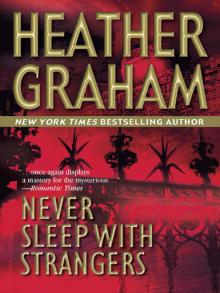 Never Sleep With Strangers
Never Sleep With Strangers Eden's Spell
Eden's Spell A Magical Christmas
A Magical Christmas Forever My Love
Forever My Love King of the Castle
King of the Castle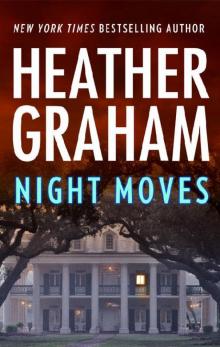 Night Moves (60th Anniversary)
Night Moves (60th Anniversary) The Island
The Island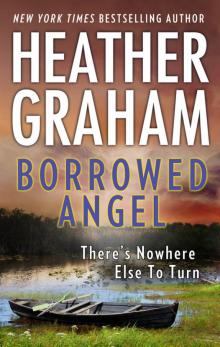 Borrowed Angel
Borrowed Angel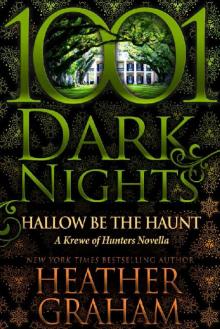 Hallow Be the Haunt: A Krewe of Hunters Novella
Hallow Be the Haunt: A Krewe of Hunters Novella Why I Love New Orleans
Why I Love New Orleans The Last Cavalier
The Last Cavalier A Matter of Circumstance
A Matter of Circumstance Heather Graham's Haunted Treasures
Heather Graham's Haunted Treasures Tempestuous Eden
Tempestuous Eden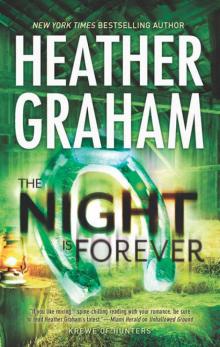 Krewe 11 - The Night Is Forever
Krewe 11 - The Night Is Forever